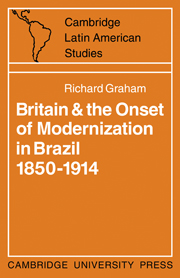Book contents
- Frontmatter
- Contents
- Preface
- Abbreviations used in the footnotes
- A note on spelling
- Brazil: physical features and state capitals
- Introduction: Contrasting Societies: Britain and Brazil
- 1 The Onset of Modernization in Brazil
- 2 Coffee and Rails
- 3 The Export–Import Complex
- 4 The Urban Style
- 5 Britain and the Industrialization of Brazil
- 6 Changing Patterns of Labor: Slave Trade and Slavery
- 7 Britain and the Entrepreneurs
- 8 Freedom and Association
- 9 Progress and Spencer
- 10 Middle-Class Britain and the Brazilian Liberals
- 11 Individual Salvation
- 12 Declining Influence
- Conclusion
- Appendix A Financial Record of the Minas and Rio Railway Company, Ltd, 1881–1902
- Appendix B Financial Record of the São Paulo Railway Company, Ltd, 1865–1920
- Appendix C Exports from Great Britain to Brazil, 1850–1909
- List of Sources
- Index
6 - Changing Patterns of Labor: Slave Trade and Slavery
Published online by Cambridge University Press: 12 October 2009
- Frontmatter
- Contents
- Preface
- Abbreviations used in the footnotes
- A note on spelling
- Brazil: physical features and state capitals
- Introduction: Contrasting Societies: Britain and Brazil
- 1 The Onset of Modernization in Brazil
- 2 Coffee and Rails
- 3 The Export–Import Complex
- 4 The Urban Style
- 5 Britain and the Industrialization of Brazil
- 6 Changing Patterns of Labor: Slave Trade and Slavery
- 7 Britain and the Entrepreneurs
- 8 Freedom and Association
- 9 Progress and Spencer
- 10 Middle-Class Britain and the Brazilian Liberals
- 11 Individual Salvation
- 12 Declining Influence
- Conclusion
- Appendix A Financial Record of the Minas and Rio Railway Company, Ltd, 1881–1902
- Appendix B Financial Record of the São Paulo Railway Company, Ltd, 1865–1920
- Appendix C Exports from Great Britain to Brazil, 1850–1909
- List of Sources
- Index
Summary
One of the most significant early landmarks on the road toward a modern society in Brazil was the end of Negro slavery in 1888. Although, seen in the context of world history, slavery may be considered a part of the mercantile expansion of Europe characteristic of the modern era, in Brazil few institutions were more clearly a part of the traditional order. It was the most eloquent manifestation of the belief in a man's immutable social position and it was the antithesis of individualism. It frustrated attempts to encourage immigration and acted as a brake on economic development. On the other hand, the abolition of slavery strengthened the modernizing, European-oriented cities that had worked for it and weakened the backward countryside. It was the coup de grâce for the sugar zone of the northeast and the old coffee regions of the Paraíba valley, and served to shift power definitely into the hands of those who controlled the new coffee area of São Paulo state. It seriously weakened the monarchy, which until then had been staunchly defended by the slave-owners: the abolitionists had pointedly referred to ‘the slave quarter barons … the buttress of throne and pillory’. Abolition contributed powerfully to economic, social, and political change in Brazil.
It was also the product of beginning change. The two sources of abolitionist sentiment were to be the coffee planters of São Paulo, dissatisfied with the dwindling supply of slaves, and the new groups on the rise within the cities that saw slavery as a threat to their world-view. The planters had to bring under cultivation ever vaster stretches of good coffee land.
- Type
- Chapter
- Information
- Britain and the Onset of Modernization in Brazil 1850–1914 , pp. 160 - 186Publisher: Cambridge University PressPrint publication year: 1968
- 1
- Cited by



